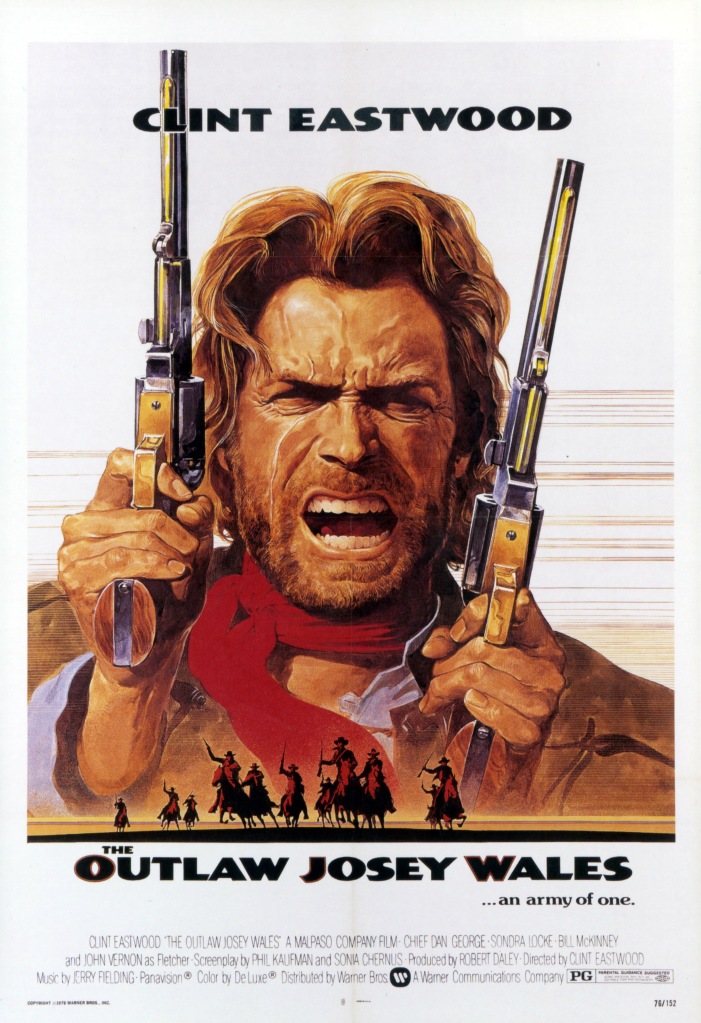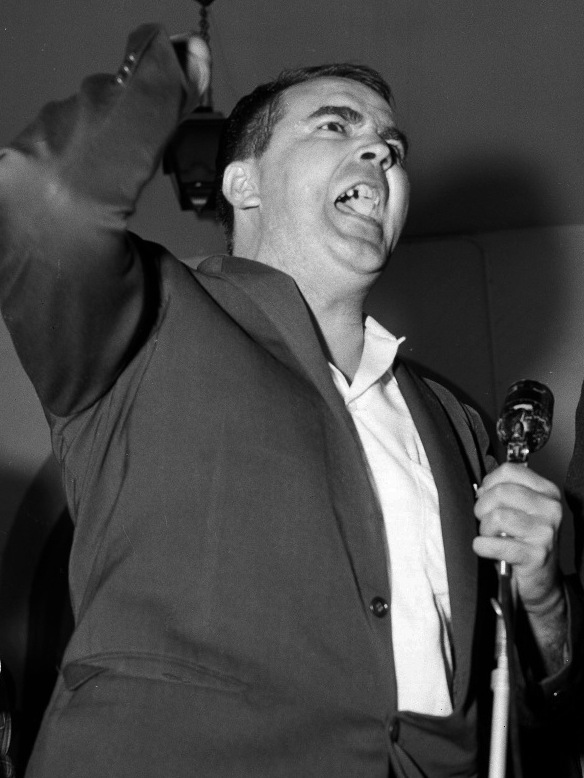Below are the notes to Season 2 Episode 11 of the Who’d a Thunk It? Podcast.
- This weeks media recommendation ties directly in to the main topic.
- The Outlaw Josey Wales movie
- My father was born in the early 60’s. Although I believe most of Clint Eastwood’s movies can be enjoyed by any generation, my father’s generation enjoys Clint’s work more-so, especially MEN of his generation.
- So I’ve seen my fair share of Clint Eastwood Spaghetti Westerns, Dirty Harry movies, and the movies Clint has made in the 21st century. But my favorite film of his is The Outlaw Jose Wales!
- This 1976 movie is on the top of the list for many Western enthusiasts
- Here is the plot **SPOILER ALERT**
- Josey Wales (played by Clint Eastwood himself) watches helplessly as his wife and child are murdered, by Union men led by Capt. Terrill. Seeking revenge, Wales joins the Confederate Army. He refuses to surrender when the war ends, but his fellow soldiers go to hand over their weapons — and are massacred by Terrill. Wales guns down some of Terrill’s men and flees to Texas, where he tries to make a new life for himself, but the bounty on his head endangers him and his new surrogate family.
- It is great movie. Check it out for yourself. I believe you can rent it for like $3 on Amazon Prime.

- Although Clint starred in and directed the film, he didn’t write it.
- The movie was based on a book titled “The Rebel Outlaw: Josey Wales.” The book was written by a man calling himself Forrest Carter. This episode is going to be about him, the man behind Josey Wales the character.

- Forrest Carter
- Forrest was a half-Cherokee cowboy author from Texas. His empathetic writing painted him as a kind soul who was regarded as a Hippy back in the 1970’s. His writing featured concepts of cultural acceptance and respect for nature.
- Along with writing Josey Wales in to existence, Carter wrote “The Education of Little Tree.”
- The story of Little Tree takes place during the fifth to tenth years of the boy’s life, as he comes to know his new home in a remote mountain hollow. Granpa runs a small moonshine operation during Prohibition. The grandparents and visitors to the hollow expose Little Tree to supposed Cherokee ways and “mountain people” values.
- The Education of Little Tree was written as a memoir recounting Forrest’s own real-life experiences growing up in southern Appalachia with his native American grandparents.
- This story was accepted by an actual Cherokee Indian and taught as literature in Native American classrooms for decades.
- The Education of Little Tree was praised by Oprah Winfrey and Carter himself was on his way to becoming a beloved American Author… but he had a secret.

- Asa Earl Carter
- Although he denied it all the way to his grave, Forrest Carter was just a pen name. His real name was Asa Earl Carter and there is a good reason why Asa Carter wanted to keep his name and his past a secret from the world.
- Asa Earl Carter ran for governor of Alabama in 1970 and was a public advocate for white supremacy.
- He was a rabid segregationist who was an infamous racist propagandist in the 1960s. A leader of the White Citizens Council (a group dedicated to opposing desegregation and one that was generally considered to be a front group for the Ku Klux Klan) of North Alabama, Carter was the head of a “klavern” of the Ku Klux Klan. He was an unofficial speechwriter for segregationist Governor George Wallace, the segregationist governor of Alabama and candidate for the Presidency (1968, ’72).
- Asa Earl Carter wrote white supremacist literature, and was a major contributor to “The Southerner,” a white-supremacist publication that he edited and published first under the aegis of the racist White Citizens Council.

- I do believe ignorance plays a major role in racism, and I try to keep that in mind. I like to think all racist people could change if they were just able to experience enough of life to let them realize, we are all in this together. But that’s probably just wishful thinking and with a track record like Asa Earl Carter, one might think the guy was just simply riddled with hate. I mean that is a terribly impressive resume for a white supremacist.
- After Carter’s real identity came out it became clear that Carter did NOT have Cherokee Grandparents and that his book of tolerance and love of nature was a work of fiction instead of a memoir. “The Education of Little Tree” ranks as one of the great literary hoaxes of American literature.
- It also became clear to the public how a hippy half-Cherokee cowboy from Texas was able to capture the spirit of the southern confederate so well in his book The Rebel Outlaw Josey Wales novel. He wasn’t any of those things.
- He wasn’t from Texas, but Alabama
- He wasn’t an orphan. His parents raised him and lived in to his adulthood.
- I should note that it was reported Clint Eastwood had no idea of Carter’s actual past when he agreed to make the Josey Wales movie. Clint was approached by the alias Forrest Carter. The likeable loving hippy cowboy.
- And this leads me to one of my favorite ethical dilemmas: should we separate the art from the artist?
- Josey Wales is one of my favorite movies, but I now know it was written by a white supremacist… True, Carter seems to have had some sort of life changing experience that made him forsake his hateful past, but he still did all those terrible things and wrote all those terribly racist speeches. Not to mention he hid who he was. Instead of courageously facing his past mistakes like his own character Josey Wales, Carter just ran from them.
- Be for warned here, I don’t have an answer to the question: should we separate the art from the artist… but I think it should be asked more often.
- If we reveal their past actions:
- Does Bill Cosby’s multiple award winning comedy career suddenly become Unfunny?
- Do Michael Jackson’s records suddenly become audible trash?
- Don’t get me wrong, I think both of those men’s actions were abhorrent, but should we just ignore all of the great things their art has done for society? Should the charities they donated to over the years give back all that money? How far should we as a society go in condemning their actions? Should we scrub the history books so it appears they never existed?
- What about other important people from History? Churchill said that he hated people with “slit eyes and pig tails.” To him, people from India were “the beastliest people in the world next to the Germans.” He admitted that he “did not really think that black people were as capable or as efficient as white people.”
- Should we hate Winston Churchill? Or should we recognize that he won a World War AND that he held racist beliefs? Should we rewrite all the history books?
- IDK. I don’t have the answer.
- If you went back with a fine toothed comb and looked at everything I said in my life and all of that information was present in your mind this very second, I’d be willing to bet all the nasty things would stick out and you’d want to stop listening to this podcast immediately. You’d probably be disgusted.
- But I’m no longer the same disrespectful and disgraceful teenager I once was.
- Like I said, IDK the answer. But I wish people would ask it more often. The dilemma is probably more present in our cancel culture society than it has ever been.

- The real life Carpet Bagger
- Now to end the episode I’d like to highlight a character from the Josey Wales film.
- In the movie there is a big raging river and a Ferry set up so people can cross said river. The man working the Ferry is a deceptive character. His name is Sim Carstairs and he encounters Union and Confederate soldiers both on a regular basis.
- Sim comes across a con-man known as the Carpet Bagger.
- In the history of the United States, carpetbagger was a derogatory term applied by Southerners to opportunistic Northerners who came to the Southern states after the American Civil War, who were perceived to be exploiting the local populace for their own financial, political, and/or social gain.
- The Carpet Bagger fraudulently tries to sell snake oil to Sim to pay for his Ferry ride. While they are conversing, Sim explains that he survives being among 2 opposing sides of the Civil War all the time by being two-faced.
- ===play clip audio on podcast===
- \/ Watch video below on Blog Post\/
“You know in my line of work, you gotta be able either to sing ‘The Battle Hymn Of The Republic’ or ‘Dixie’ with equal enthusiasm… dependin’ upon present company.” – Sim Carstairs
“Can says as I blame you for that. Only good business to play it safe.” -The Carpet Bagger
- Dixie is a Southern Song while Battle Hym of the Republic is a Northern favorite.
- This scene has permeated through the fog of my childhood memory. It always stuck out to me that in order to survive a person would pretend to care about one cause or another. I revered the survival tactic, but the film portrays Sim as a weak and slimy character. Maybe it says something about me that I respected such a character at a young age.
- But I also appreciated the symbolic connection between Sim’s deceptive way of life and the deceptive life Asa Earl Carter led.
- Both Sim and Carter walked to the beat of 2 opposing sides’ drums when it suited them best.
CREDIT:
- The Artful Reinvention Of Klansman Asa Earl Carter : NPR
- The Real Education of Little Tree – Texas Monthly
- Forrest Carter – Biography – IMDb
- Yes, Churchill was a racist. It’s time to break free of his ‘great white men’ view of history (opinion) – CNN
If you are like me and prefer to listen instead of read, then you are in luck. Everything above is read aloud by me for the Who’d a Thunk it? Podcast. By now the Who’d a Thunk It has reached people in 42 countries. It is hosted by Anchor.fm but you can also find Who’d a Thunk It on:
If you would like to contact me, feel free to comment on this blog post, or email me at WhodaThunkItPodcast@gmail.com
